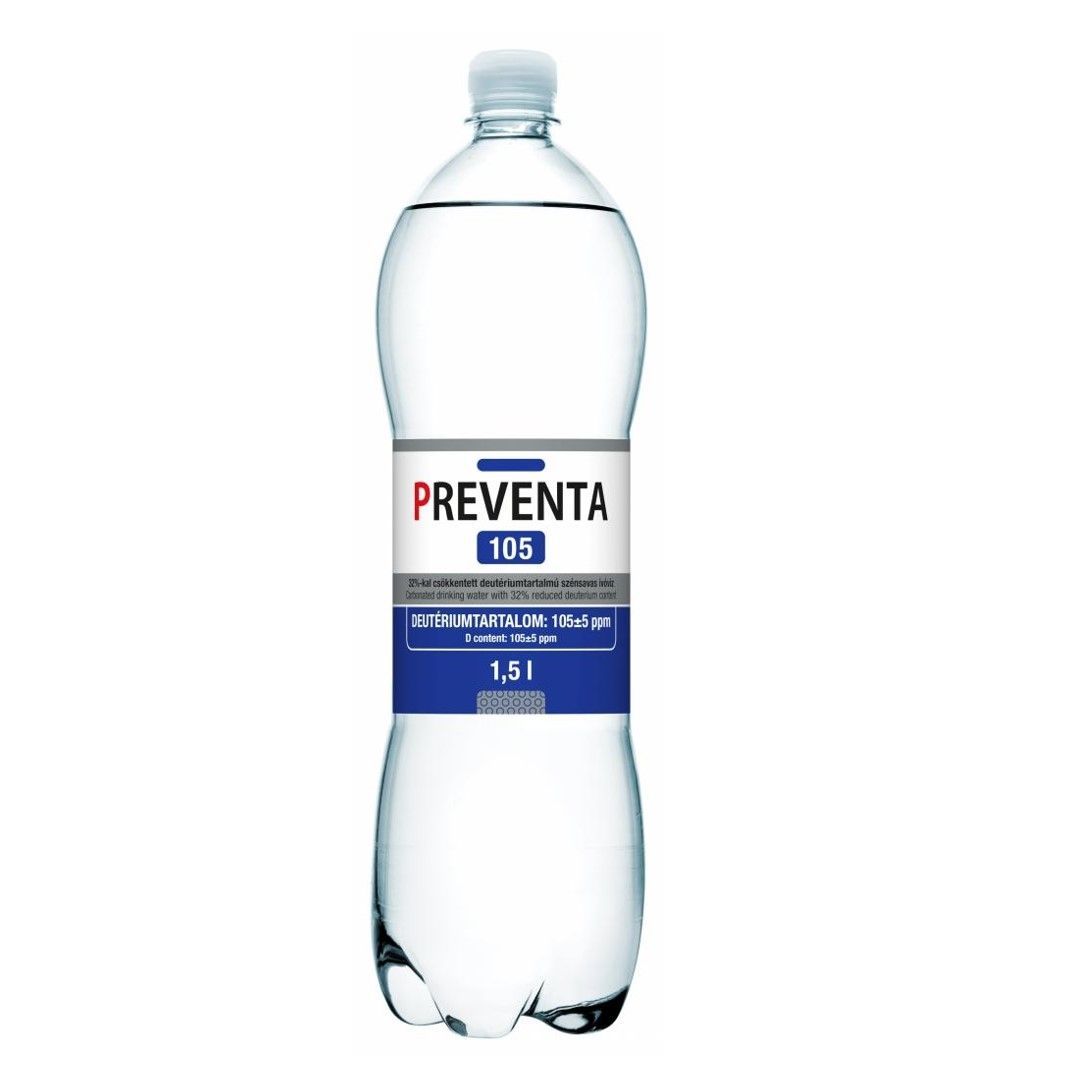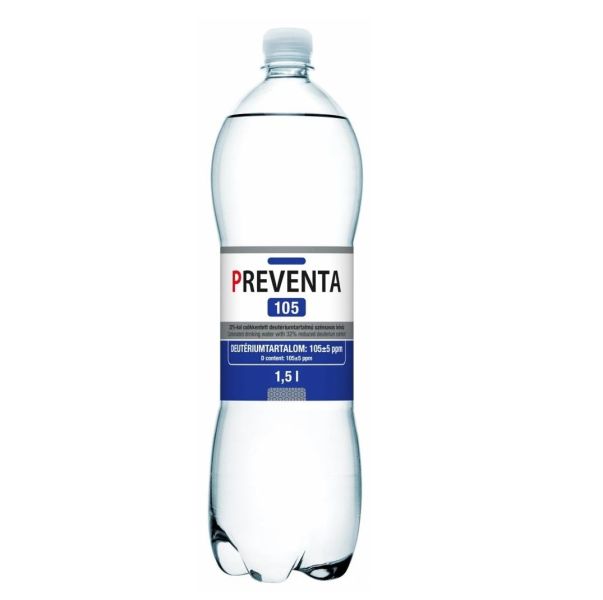About Preventa 105ppm Deuterium Depleted Water DDW Case (12 x 1.5L Bottles)
Deuterium content: 105 ppm (220 mg/l HDO); 1.5 L Mineral content: low in Sodium, Calcium-, and Magnesium-hydrogencarbonate. Non-carbonated, 1 case contains 12 bottles.
Please note: We do not provide free returns for this product. We are currently only ship to the UK.
What is deuterium and Preventa® deuterium-depleted drinking water?
Deuterium, a.k.a. heavy hydrogen, is a naturally occurring stable – non-radioactive – variation of hydrogen. The atomic nucleus of hydrogen consists of one proton only, but the deuterium nucleus contains one proton and one neutron. This considerable, twofold mass difference causes significant differences in the physical and chemical properties of hydrogen and deuterium. Preventa, the world’s first drinking water product family with lowered deuterium content, was developed on the basis of an international patent by HYD LLC. Preventa drinking water was licensed by the Budapest Veterinary Health and Food Control Station in 1999, based on expert opinion of Fodor József National Centre of Public Health, Institute of Environmental Health, and National Institute for Food and Nutrition Science.
Why should we drink Preventa deuterium-depleted water?
Research shows that decreasing the level of deuterium in the tissues and organs is a natural biological process. However, the body’s ability to deplete deuterium decreases as we get older, sicker and get less exercise or sunlight. This natural system is the target of the deuterium depleting procedure. By changing the deuterium level of drinking water below the natural level, the deuterium content in the body can be kept low even if the said natural cell process is faulty. By proper choice and continuous consumption, deuterium depletion in the organism can be maintained for long periods.
What is the recommended daily amount of deuterium-depleted water?
It is possible to cover the daily water intake (1.5-2 liters a day for an adult of average body weight) with deuterium-depleted water, which can be consumed as such but can also be flavored or used for cooking or making tea or coffee. It is important that intake of fluid with normal deuterium level (tap water, mineral waters, soft drinks, fruit juices, milk) should be minimized.
Which Preventa water should one choose?
The lower is the deuterium content of a given Preventa water, the farther it is from that of the natural waters which is 140-145 ppm in our climatic zone. By proper choice and continuous consumption, deuterium depletion in the organism can be maintained for long periods.
How to lower the deuterium content of the body?
The easiest way to influence the deuterium content of our body is to decrease the deuterium concentration of drinking water. By consuming drinking water with lower than natural deuterium concentration, deuterium content in our organism will be decreased because the organism’s normal water content will mix with the deuterium-depleted water.
This can be complemented by other deuterium-depleted foods – e.g., a deuterium-depleted mushroom extract – because their organic molecules are also low in deuterium. Supplemental consumption of plants grown under deuterium-depleted conditions, or foods made from the former, can contribute to more efficient lowering of deuterium content in the body. Deuterium-depleted foodstuffs represent a novel product category, the characteristic property of which is, in analogy to cholesterol-free or low carbohydrate foods, the low deuterium content.
What are the specialities of Preventa deuterium-depleted drinking waters? – How deuterium content is determined?
The deuterium content of Preventa drinking waters is by far lower than the natural value, and the degree of depletion is higher than the natural variation of deuterium level. The deuterium content of water is normally given in ppm (parts per million) units, which shows, how many in one million hydrogen atoms are deuterium, or how many in one million water (H2O) molecules are heavy water (D2O). Deuterium content can be measured by mass spectrometry and laser-based techniques.
What is the meaning of numbers indicated on Preventa deuterium-depleted products?
The numbers indicated in the names of Preventa drinking waters mean the deuterium content of that product in ppm units. Accordingly, Preventa 125 contains 125 ppm, Preventa 105 contains 105 ppm, and Preventa 85 contains 85 ppm deuterium, in contrast to the 140-145 ppm typical for surface waters – and hence, for ordinary tap water – in our geographical zone.
Carbonated or non-carbonated?
Mineral waters and drinking waters are available in carbonated and non-carbonated form. It is important to know that the two variations have approximately the same mineral content, therefore there is no significant difference between them as regards acid-base balance in the organism. Added carbon dioxide contributes to the long-term stability of the quality of waters.
What is the natural global variations of the deuterium content of precipitation? – About the deuterium content of the human body
The deuterium content of living organisms is determined primarily by the deuterium level of oceanic water and of precipitation arriving at the ground. Deuterium level in precipitation decreases from the Equator to the North and South Pole, from the oceans into the continents, and in proportion with increasing elevation. In our climatic zone, deuterium content of the surface waters is 140-150 ppm with little variability. The human body consists prevailingly of water, but the proportion of water decreases with age. Considering that ca. 60% of our body is water, and that organic compounds also contain deuterium, the concentration of deuterium in the human organism is severalfold higher than the normal level of other physiologically important elements such as calcium, potassium or magnesium.
What is the method of reducing deuterium level in water?
Deuterium-depleted water is produced by an energy-demanding technology based on differences in the physicochemical properties of normal water (H2O) and heavy water (D2O). Due to a boiling point difference of merely 1.5°C, the concentration of heavy water (with higher boiling point) is lower in the vapour phase and this fact is utilized for producing deuterium-depleted water. By repeating evaporation several times in so-called distillation columns, the deuterium content of water can be reduced to any level.
Is there a way to produce home-made deuterium-depleted water?
By means of home distillers, not more than 1 ppm decrease can be achieved by single, or 2-3 ppm by double distillation, and this is insignificantly little change in the deuterium concentration of water. Substantial decrease of deuterium content in water can be achieved only by an industrial scale technology, fractional distillation. Preventa products contain 15 to 84% less deuterium than our natural waters, whereas home distillers alter the deuterium content of water by a mere 1-1.5%.

